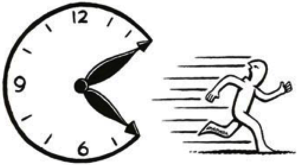What Time is It? Inspiring a shift from tic-toc to lub-dub.

Imagine a flowering plant. A baking cake. A rising stock price. A healing wound. Time passing can be a beautiful thing.

Imagine a flowering plant. A baking cake. A rising stock price. A healing wound. Time passing can be a beautiful thing.
Online Training for Teaching Mindfulness In Your Clinical Practice
 One of my best friends, a college roommate and a man whom I respect greatly questioned me. Somewhat unexpectedly. He is, to put it kindly, a late-adopter. Generally, when I’m rattling on about my latest new tech gadget (“You should see it! I can stream my music from my phone to my stereo!” “No, there is no optical drive.”), he does the polite nod and waits for me to finish.
One of my best friends, a college roommate and a man whom I respect greatly questioned me. Somewhat unexpectedly. He is, to put it kindly, a late-adopter. Generally, when I’m rattling on about my latest new tech gadget (“You should see it! I can stream my music from my phone to my stereo!” “No, there is no optical drive.”), he does the polite nod and waits for me to finish.
When challenging or unwanted thoughts, emotions or behaviors arise most of us want to avoid or distract ourselves. We may use food, drugs, work or exercise to temporarily sooth, comfort or numb the difficult internal experience. Unfortunately, repeatedly coping in this way creates a habituated pattern that carries with it more shame and fear, and the hope of change slips further away into a seemingly endless out-of-control cycle.
After spending over fifteen years in corporate America, I understand the challenges that face busy, success-motivated executives. I spent many years on the corporate treadmill trying to “make it all work,” only to find that my personal health and wellness suffered as a result. Determined to find a better way, I finally turned the corner by discovering a few simple tools that changed my life – both personally and professionally – and helped me find balance. The solution is easier than you might think.
On the opening page of Mark Nepos’s book Seven Thousand Ways to Listen, he quotes an epigraph by Abraham Heschel:
[We] will not perish for want of information; but only for want of appreciation . . . What we lack is not a will to believe but a will to wonder . . . Reverence is one of [our] answers to the presence of mystery . . .
Well of course that makes sense! We leave work and drive too fast to get home so we can finally relax. Between patients we scribble notes in the file, run to the bathroom, and make a phone call while slurping caffeine so that after the next patient we can catch our breath. We inhale lunch without looking at it while we order holiday gifts on online because we don’t want to waste time just eating.
I believe that small acts of compassion by individuals can make a HUGE impact on our world. Yes, it sounds cliché and unrealistic, but I know it’s true. How can I possibly know that? Because Compassion It, the organization I’ve founded, has gone from an idea to a global social movement thanks to a handful of small acts by individuals.
Let me explain…
Dr. Kristin Neff and Dr. Christopher Germer have dedicated years to studying, researching, and teaching self-compassion. All of this dedicated effort and passion have resulted in the Mindful Self Compassion (MSC) program, a research- and skill-based eight week training similar in format to Mindfulness-Based Stress Reduction (MBSR) but focused on this key component of how we meet our own suffering.
Loneliness and boredom are often triggers for eating comfort foods, or for eating at inappropriate times. When we feel the impulse to eat at an odd time (such as an hour after lunch or when we can't fall asleep at night ) we can take a moment to investigate what is happening in our body, heart and mind.
Scroll to Top